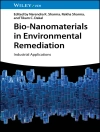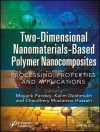2D NANOMATERIALS
The book provides a comprehensive overview of the synthesis, modification, characterization, and application of 2D nanomaterials.
In recent years, 2D nanomaterials have emerged as a remarkable cornerstone in the field of advanced materials research, with their unique properties and versatile applications captivating the attention of scientists and engineers worldwide. This book is a testament to the ever-growing interest and importance of 2D nanomaterials in the realm of materials science, nanotechnology, pharmaceuticals, and a myriad of engineering specializations.
The book is structured into three sections, each delving into different aspects of 2D nanomaterials. The first section explores the synthesis of these materials, providing an overview of both top-down and bottom-up strategies. Understanding the methods by which these materials can be synthesized is crucial for advancing their potential applications. Additionally, this section details the structural characterization of 2D nanomaterials, shedding light on their intricate compositions and properties. The second section examines the diverse characteristics exhibited by 2D nanomaterials. From their magnetic and mechanical properties to their electrical, plasmonic, and optical behaviors, these materials possess an array of intriguing attributes that make them highly attractive for a wide range of applications. This section of the book provides a comprehensive understanding of these properties, enabling readers to appreciate the unique potential of 2D nanomaterials. The final section focuses on the applications of 2D nanomaterials, highlighting their use in various fields such as energy, water purification, biomedical applications, multimodal tumor therapy, and supercapacitor technology.
Mengenai Pengarang
Subhendu Chakroborty, Ph.D., received his doctorate in chemistry from Ravenshaw University, India. He is a professor at the School of Applied Sciences, Chandigarh University, Lucknow, Uttar Pradesh, India. His research interests include the synthesis of perovskite and 2D nanomaterials for applications in biomedicine, sensors, biomaterials, etc. He has produced more than 40 scientific publications in materials science and medicinal chemistry.
Kaushik Pal, Ph.D., received his doctorate in physics from the University of Kalyani, India. He is an associate professor at the University Centre for Research and Development, Chandigarh University, India. His current research focuses on nanofabrication, renewable energy materials, green chemistry, etc. He has contributed innovative discoveries and smart teaching cultivated at top-tier institutions.












